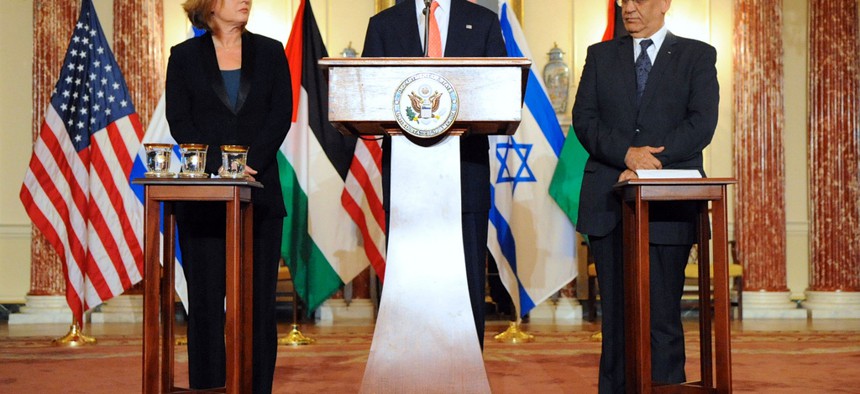What If John Kerry Outperforms Hillary Clinton as America’s Top Diplomat?
Kerry has already brought Israeli and Palestinian negotiators together for the first time in years.
Hillary Rodham Clinton happened to be in Washington during a week of front-page headlines about how her successor had nudged Israeli and Palestinian officials back to the negotiating table. So far, Secretary of State John Kerry has merely orchestrated talks about talks, but they are the first ones in three years, so it’s still a milestone of sorts.
Kerry’s investment of time and capital could evaporate at any moment, of course—he concedes there is “no shortage of passionate skeptics” about this latest round of preliminaries. But there’s also a small chance that he and President Obama could be headed for a historic achievement. In which case, Kerry could end up overshadowing Clinton as America’s top diplomat. How would that affect her place in history or, more immediately, a 2016 presidential bid?
Clinton gets credit from State Department watchers on many fronts, from improving America’s post-Bush image around the world to integrating women into departmental decision-making. She has fans across the political spectrum. Heather Hurlburt, executive director of the liberal National Security Network, says Clinton’s “signal achievement was to restore a sense of U.S. leadership and engagement on the diplomatic side as opposed to the military side.” Steven Bucci, director of the Center for Foreign Policy Studies at the conservative Heritage Foundation, calls her “the best friend the Department of Defense had in Washington. She was a masterful coordinator.” She also had record-breaking stamina—112 countries visited and nearly 957,000 miles logged during 401 days on the road.
Yet even some Clinton admirers acknowledge the absence of a breakthrough, headline-grabbing accomplishment—no Marshall Plan, no détente with the Soviets, no Dayton Accords. The most memorable moment of her tenure was a tragic one, the killing of U.S. Ambassador Chris Stevens and three other Americans in Benghazi, Libya, on Sept. 11, 2012. Republicans intend to use the incident to attack Clinton if she runs for the White House in 2016, and there is no single achievement that would be a counterbalance.
Perhaps none of this will matter. While Kerry deserves credit, many observers note that certain forces made the present moment different and more conducive to Israeli-Palestinian talks. “This is not happening because of changes in leadership at the State Department or policy changes in the United States,” says Stan Greenberg, a Democratic pollster and strategist who advises Israeli as well as U.S. politicians. “It’s probably more about Israeli politics than anything else.”
Several key players are in the hunt for legacies, starting with Obama, a lame duck. “If you can get something accomplished in the Middle East, you go out in style,” says political scientist Zeev Maoz, a Middle East expert at the University of California (Davis). Israeli Prime Minister Benjamin Netanyahu may also have his eye on history, and on reinventing himself, after an unexpectedly close call in last January’s elections. Kerry, 69, is a former senator and a failed 2004 Democratic presidential nominee with a lifetime of involvement in foreign affairs. This job is the capstone of his career and likely his last chance to make a mark.
Clinton has already notched several historic firsts—including first first lady to be elected senator and first competitive female presidential candidate—and is mulling another White House campaign. “If you thought you might want to run for president some day, you would not want to jump into something as time-consuming, as fraught in American domestic politics, as the Middle East,” Hurlburt says.
After missteps and failures in a first-term Israeli-Palestinian peace initiative, Obama signaled renewed interest when he gave a rousing speech to Israeli students in Jerusalem in March. But he is leaving the heavy lifting this time to Kerry, presumably until there is reason for him to step in to close a deal. That’s in contrast to his first term, when Obama took ownership of major policy initiatives and Clinton was a team player. Neither of them formulated an overarching strategy to handle the Arab Spring, instead responding to individual countries as situations arose.While Clinton’s tenure yields no obvious presidential campaign slogan or bumper sticker,
While Clinton's tenure yields no obvious presidential campaign slogan or bumper sticker, her efforts will be useful as “the credentialing that shows her global experience,” Greenberg says. So will the book Clinton plans to publish about her years as secretary of State. It’s due June 1, a few weeks after the end of the nine-month commitment Kerry extracted from the Israeli and Palestinian negotiators to keep talking.
“If he is successful, or close, Kerry will get a huge amount of credit, and he’ll deserve that. It’ll be a wonderful personal and political redemption as well as being a major help to U.S. interests in the region,” Hurlburt says. But it won’t affect a Clinton run, she adds. “People are going to be focused back on Clinton primarily on domestic concerns. They’re not going to go after her and say, ‘Why didn’t she get Middle East peace?’ It’s like that joke about Jesus walking on water—that shows he can’t swim.”
In fact, Clinton could benefit if Kerry somehow manages to achieve what eluded her and Obama in his first term. If she runs and wins the Democratic nomination, she would need to persuade swing voters to sign on for what they would surely see as an extension of Obama’s administration and policies. A historic success and a rise in Obama’s approval rating would not hurt that argument at all.



